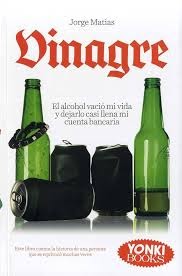
Original Language: español
Year of publication: 2023
Valoración: Very necessary
Although in other countries it is more common (although not enough yet) what is known as Working Class Literature/Workers Literature, in Spain as always, and in fragrant contradiction with the name of the party that governs us, we continue to the tail. This autobiographical novel about alcoholism, more than recommended, is very necessary, as I put in the assessment; Among other reasons because as its Madrid author belongs to a generation that someone came up with a good, very naive noceful manner on page 115:
… There are no stories written by Spanish working -class alcoholics …
Sadly, this is true. What there are and abound to seas, are or autobiographical novels about this addiction, but of medium and high/very high, intellectual, academic social classes … or non -autobiographical novels but that become more of the same. That is, it is shocking that in the 21st century, it is still believed that the workers and workers do not read, or do not write, or have nothing interesting to say. And even more serious is that the publishers to which I have no doubt that writings of this type are arriving, they simply do not publish them, due to that inbreeding, sectarian and dark classism that always, I always take advantage of to denounce, because here it is plague. Each time with more impudence, if you do not have a doctorate or you have won five awards, they do not publish you. But vinegar is also very necessary for other reasons: without falling at any time in the typical self -help or even more typical overcoming, he gets reflections and that you empathize with pain around alcohol and its consequences, both in the short and long term. The reading rhythm is so fluid that it becomes filmic, and the identification with the character/author, instantaneous. He also manages to feel like him, even if you are not a man like him, or Jevi (he writes it) like him, no metal worker like him. When you close the book on the last page, that sudden vacuum of the reading so rare and tells yourself invades you: what a shame. Well, the author ends up being your friend.
It is as if he had opened a crop for more writing of the style on the one hand. And on the other and inevitably, fill us with those that although we are not of a working class as such, for the infinite effort of (m) parents who died early so that we could access the university, we carry that inner shield; Let us belong to the following category: Precarious. Some with pride we carry that shield even if we load that ancestral suffering, as is my case. But others not so much, or not anything, rather. Because it continues to fill the work with piecework, sweaty, manual, factory. And that Jorge Matías dares with an immense honesty, in many occasions tragicomic, to display the myth of the illiterate worker and many other transverse and sacred such as that alcohol is a soft drug, constitutes a totally radical turn of acting in the genre. The author dedicates practically the entire book, with temporary jumps through, to dissect to what extent this drug fractures and strange of the people around us, and of ourselves. At times, it is almost a horror novel, because it makes it reaching the Fundo Most Fund, that background that everyone wants to avoid, in tune with the substance that speaks, which causes more damage in Spain and continues to be well seen.
I remember reading the woman’s daughter for the cleaning of James Stephens, a spontaneous gift of the Maquetora or perhaps editor of Ediciones del Viento because they did not want to publish me, (and it is seen that I gave her pity). It is time to read to the same cleaning woman. Without a man who speaks for her. Even without daughter.
Signed: Rosanna Moreda
Source: https://unlibroaldia.blogspot.com/2025/07/colaboracion-vinagre-de-jorge-matias.html


